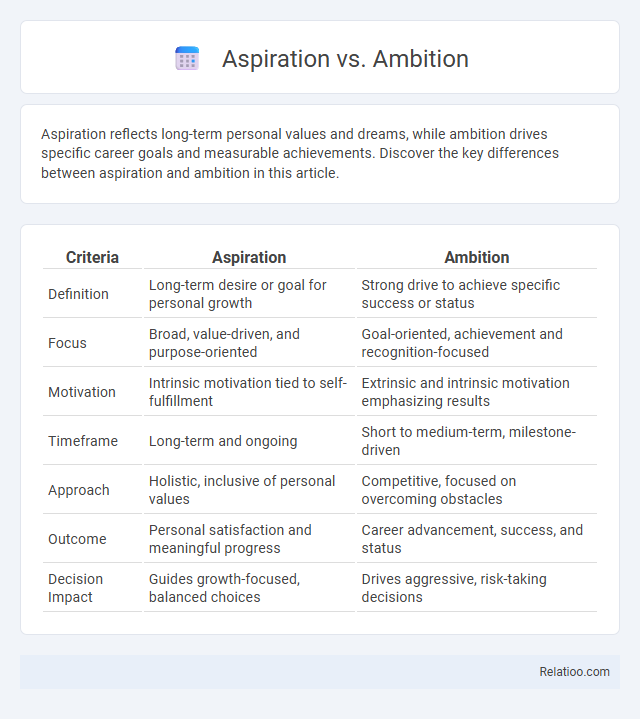Aspiration reflects long-term personal values and dreams, while ambition drives specific career goals and measurable achievements. Discover the key differences between aspiration and ambition in this article.
Table of Comparison
| Criteria | Aspiration | Ambition |
|---|---|---|
| Definition | Long-term desire or goal for personal growth | Strong drive to achieve specific success or status |
| Focus | Broad, value-driven, and purpose-oriented | Goal-oriented, achievement and recognition-focused |
| Motivation | Intrinsic motivation tied to self-fulfillment | Extrinsic and intrinsic motivation emphasizing results |
| Timeframe | Long-term and ongoing | Short to medium-term, milestone-driven |
| Approach | Holistic, inclusive of personal values | Competitive, focused on overcoming obstacles |
| Outcome | Personal satisfaction and meaningful progress | Career advancement, success, and status |
| Decision Impact | Guides growth-focused, balanced choices | Drives aggressive, risk-taking decisions |
Understanding Aspiration: Definition and Key Features
Aspiration refers to a strong desire to achieve something meaningful, often driven by personal values and long-term goals. Key features include a focus on intrinsic motivation, emotional connection, and a vision for growth or self-improvement. Unlike ambition, which emphasizes external success and competition, aspiration centers on inner fulfillment and purposeful direction.
What is Ambition? Meaning and Core Characteristics
Ambition is a strong, focused desire to achieve specific goals or attain success, often driven by personal motivation and determination. It embodies a proactive mindset characterized by persistence, goal orientation, and a willingness to overcome obstacles. Core characteristics of ambition include clarity of purpose, strategic planning, and an intrinsic drive to excel and advance in one's career or personal endeavors.
Aspiration vs Ambition: Core Differences
Aspiration reflects a deep, intrinsic desire to achieve personal growth or meaningful goals, often tied to values and long-term fulfillment. Ambition is characterized by a strong drive for success, status, or achievement, frequently motivated by external rewards or recognition. The core difference lies in aspiration's emphasis on internal satisfaction and purpose, while ambition focuses on outward accomplishments and competitive advancement.
The Psychological Roots of Aspiration and Ambition
Aspiration stems from intrinsic motivation tied to personal values and long-term fulfillment, often influenced by self-identity and emotional satisfaction. Ambition is rooted in a competitive drive, shaped by external validation, societal expectations, and the desire for status or power. Psychoanalytical theories suggest aspiration aligns with self-actualization needs, while ambition is linked to achieving ego validation through goal-oriented behavior.
Motivational Impact: How Aspirations Drive Action
Aspirations fuel motivation by providing a clear vision of desired outcomes, which intensifies focus and persistence in goal pursuit. Ambition channels this energy toward measurable achievements, often pushing individuals to overcome obstacles and competitive challenges. Together, these forces create a powerful dynamic that drives continuous action, growth, and the realization of personal or professional milestones.
Goal Setting: Ambition as a Tool for Achievement
Ambition drives your goal setting by providing clear direction and measurable outcomes, fueling progress toward success. Unlike aspiration, which reflects a general desire or hope, ambition transforms goals into actionable plans with specific milestones. Leveraging ambition effectively accelerates achievement by maintaining focus and motivation throughout the journey.
Benefits and Drawbacks of Aspiration
Aspiration represents a long-term desire for personal growth or achievement, often fueled by intrinsic motivation, which promotes sustained commitment and fulfillment. However, excessive aspiration can lead to unrealistic expectations and potential disappointment if goals are unattainable or progress is slow. Balancing aspiration with practicality is crucial to harness its benefits while mitigating stress and frustration.
Pros and Cons of Ambition in Personal Growth
Ambition drives individuals to set high goals and persistently strive for personal growth, fostering self-discipline, resilience, and achievement. However, excessive ambition can lead to stress, burnout, and dissatisfaction if goals are unrealistic or if it overshadows work-life balance. Balancing ambition with self-awareness and realistic expectations maximizes its benefits while minimizing negative impacts on mental health and relationships.
Balancing Aspiration and Ambition for Success
Balancing aspiration and ambition is crucial for achieving sustainable success, as aspiration represents your long-term goals guided by values, while ambition drives the competitive actions needed to reach those goals. You must align ambition with aspiration to maintain motivation without sacrificing well-being or integrity. Striking this balance ensures focused effort toward meaningful achievements and personal fulfillment.
Cultivating a Healthy Mindset: Integrating Aspiration and Ambition
Cultivating a healthy mindset involves harmonizing aspiration and ambition by setting realistic goals while maintaining intrinsic motivation and self-compassion. Aspiration drives long-term vision and personal growth, whereas ambition fuels the determination to achieve specific milestones with focused effort. Integrating both fosters resilience, balances self-expectations, and promotes sustainable success without compromising mental well-being.

Infographic: Aspiration vs Ambition
 relatioo.com
relatioo.com